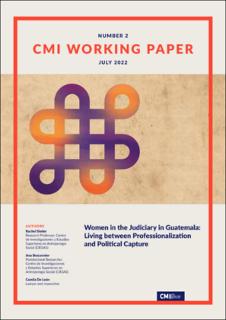Women in the Judiciary in Guatemala: Living between Professionalization and Political Capture
Working paper
Permanent lenke
https://hdl.handle.net/11250/3003574Utgivelsesdato
2022-07-01Metadata
Vis full innførselSamlinger
- Publications [1488]
Originalversjon
Bergen: Chr. Michelsen Institute (CMI Working Paper WP 2022:2) 54 p.Sammendrag
Studies of female judges have tended to focus on the Global North, analyzing the factors that explain the presence or absence of women in the courts, the impact of informal institutional cultures on their professional opportunities, and whether they adjudicate cases differently from their male counterparts. Most of these studies assume that “glass ceilings” or patriarchal relationships are the main obstacles to women’s career advancement in the judiciary. “Glass ceilings” refer to invisible barriers created by unwritten rules that prevent women from advancing to decision-making positions in their professional careers. However, there is less analysis focused on the experiences of women judges in fragile states where, despite reforms to increase judicial independence, external pressures and informal politics within the judiciary continue to limit judges’ independence. What can the study of women judges in fragile or regressive authoritarian states tell us about the procedures and prospects for institutional transformation? Our analysis of the situation of women judges in Guatemala reveals that they experience pressures to limit their independence in gender-specific ways. Focusing on women’s experiences as they enter a judicial career and work as judges enriches our understanding of the limits to judicial independence and the process of political capture in fragile states, as well as the ways in which gender differences manifest themselves in patriarchal social and institutional cultures.
